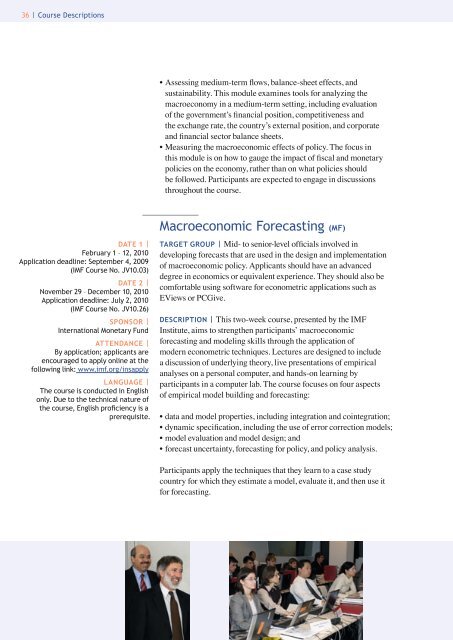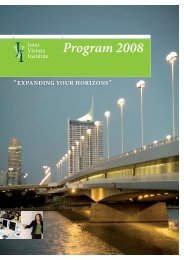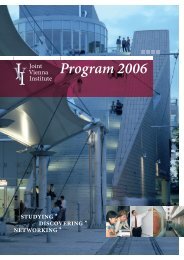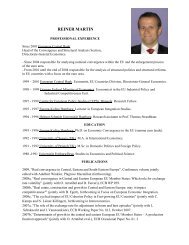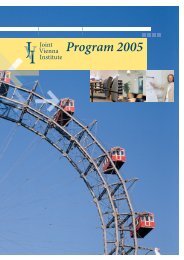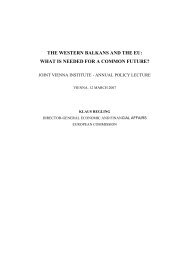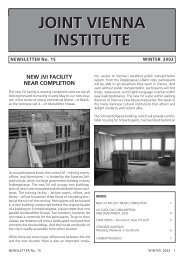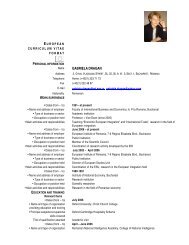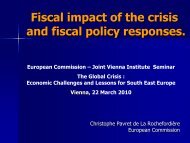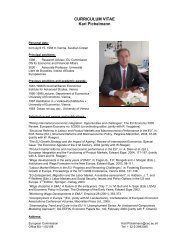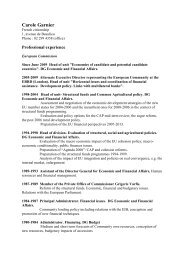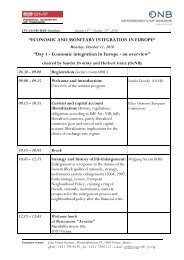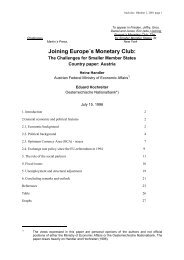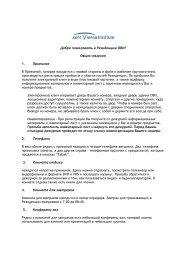Program 2010 - Joint Vienna Institute
Program 2010 - Joint Vienna Institute
Program 2010 - Joint Vienna Institute
- No tags were found...
You also want an ePaper? Increase the reach of your titles
YUMPU automatically turns print PDFs into web optimized ePapers that Google loves.
36 | Course Descriptions<br />
• Assessing medium-term flows, balance-sheet effects, and<br />
sustainability. This module examines tools for analyzing the<br />
macroeconomy in a medium-term setting, including evaluation<br />
of the government’s financial position, competitiveness and<br />
the exchange rate, the country’s external position, and corporate<br />
and financial sector balance sheets.<br />
• Measuring the macroeconomic effects of policy. The focus in<br />
this module is on how to gauge the impact of fiscal and monetary<br />
policies on the economy, rather than on what policies should<br />
be followed. Participants are expected to engage in discussions<br />
throughout the course.<br />
Date 1 |<br />
February 1 – 12, <strong>2010</strong><br />
Application deadline: September 4, 2009<br />
(IMF Course No. JV10.03)<br />
Date 2 |<br />
November 29 – December 10, <strong>2010</strong><br />
Application deadline: July 2, <strong>2010</strong><br />
(IMF Course No. JV10.26)<br />
Sponsor |<br />
International Monetary Fund<br />
Attendance |<br />
By application; applicants are<br />
encouraged to apply online at the<br />
following link: www.imf.org/insapply<br />
Language |<br />
The course is conducted in English<br />
only. Due to the technical nature of<br />
the course, English proficiency is a<br />
prerequisite.<br />
Macroeconomic Forecasting (MF)<br />
Target group | Mid- to senior-level officials involved in<br />
developing forecasts that are used in the design and implementation<br />
of macroeconomic policy. Applicants should have an advanced<br />
degree in economics or equivalent experience. They should also be<br />
comfortable using software for econometric applications such as<br />
EViews or PCGive.<br />
description | This two-week course, presented by the IMF<br />
<strong>Institute</strong>, aims to strengthen participants’ macroeconomic<br />
forecasting and modeling skills through the application of<br />
modern econometric techniques. Lectures are designed to include<br />
a discussion of underlying theory, live presentations of empirical<br />
analyses on a personal computer, and hands-on learning by<br />
participants in a computer lab. The course focuses on four aspects<br />
of empirical model building and forecasting:<br />
• data and model properties, including integration and cointegration;<br />
• dynamic specification, including the use of error correction models;<br />
• model evaluation and model design; and<br />
• forecast uncertainty, forecasting for policy, and policy analysis.<br />
Participants apply the techniques that they learn to a case study<br />
country for which they estimate a model, evaluate it, and then use it<br />
for forecasting.


